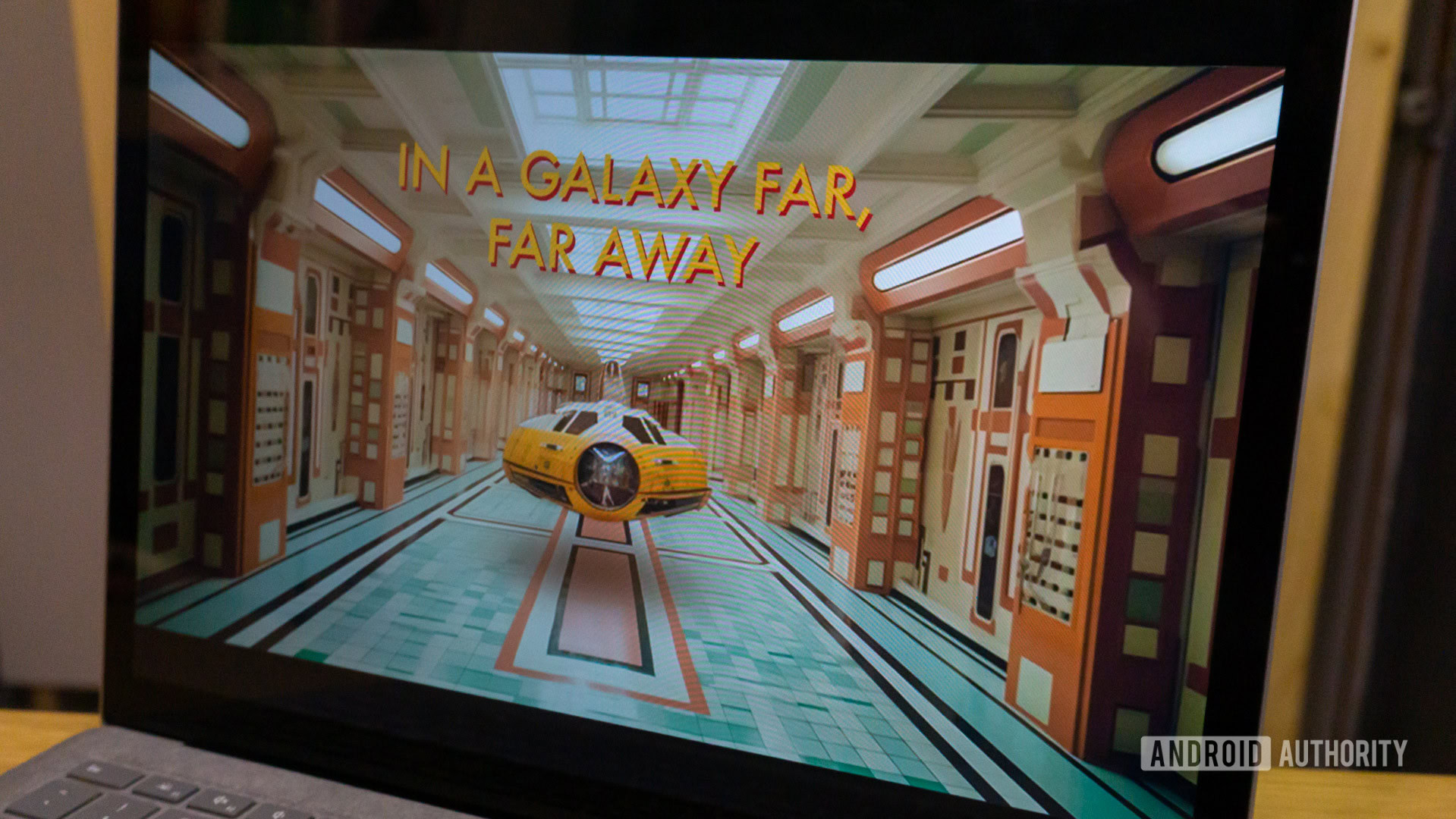Affiliate links on Android Authority may earn us a commission. Learn more.
Midjourney vs Stable Diffusion: Which AI image generator should you use?
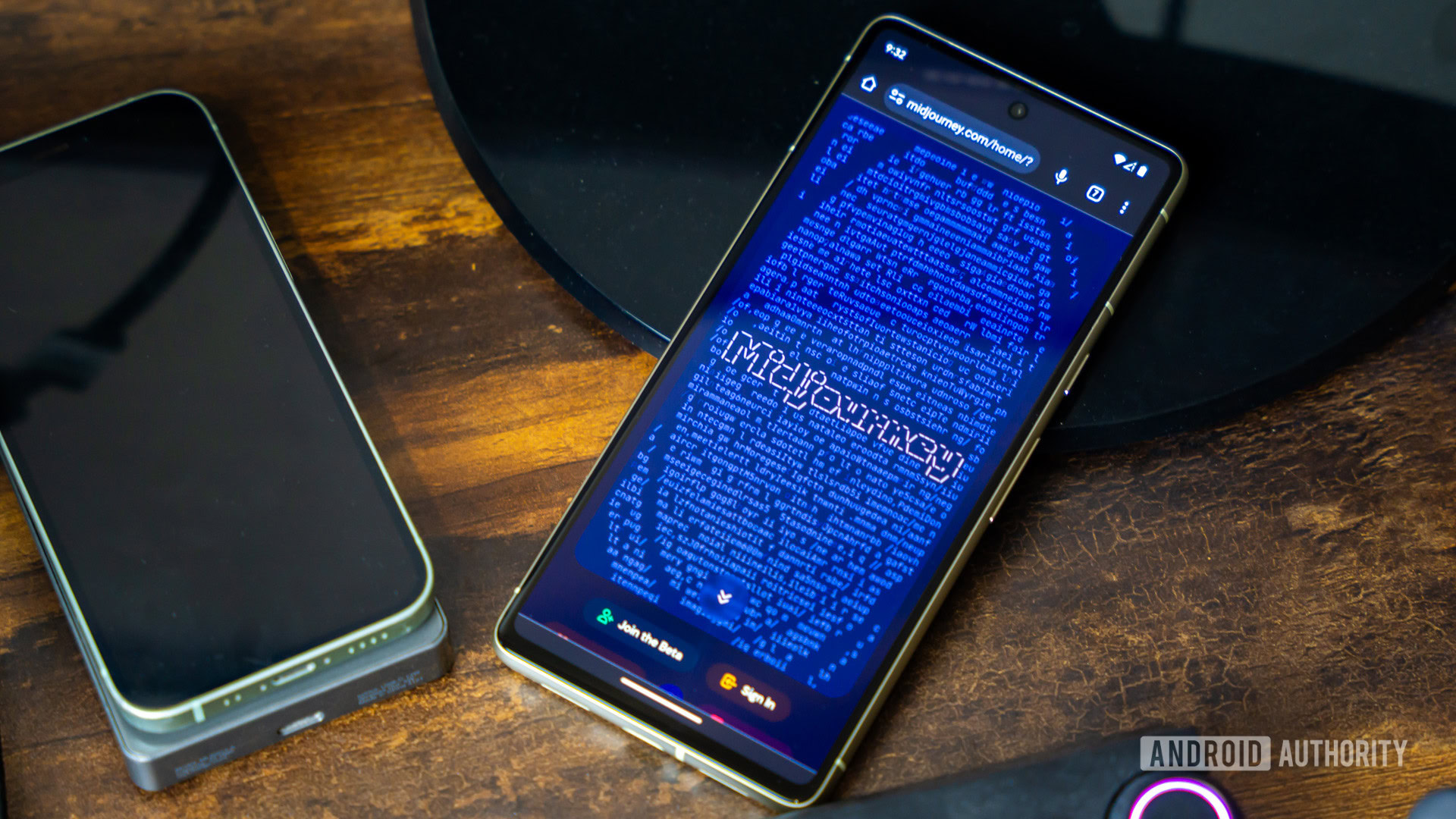
We’ve witnessed a sudden explosion of generative AI tools over the past few months. And nowhere is that more true than in the image generator arena. Between free and paid, open-source and proprietary, there are many options out there to choose from. But if you’ve paid some attention to discussions surrounding AI-generated art, you’ve undoubtedly heard of the fierce rivalry between Midjourney vs Stable Diffusion.
While both AI image generators do an excellent job, they differ in terms of customization features, art styles, ease of use, pricing, and more. So in this article, let’s take a look at what separates the two and which one you should use.
If you’re in a hurry, here’s a quick summary of how Midjourney differs vs Stable Diffusion:
- Midjourney uses a proprietary machine learning model, while Stable Diffusion has its source code available for free.
- You can download and run Stable Diffusion on your own computer, provided it meets the requirements. Midjourney can only be used with an internet connection.
- The only way to access Midjourney is through the Discord chat app, although a web-based version is on the way. On the other hand, you can use Stable Diffusion via a variety of online and offline apps.
- Midjourney costs a minimum of $10 per month for limited image generations. You can run Stable Diffusion on your own hardware for free or pay a nominal fee for online services.
- You can use Stable Diffusion to fill or modify only certain parts of an image. As of June 2023, Midjourney also gained inpainting and outpainting via the Zoom Out button.
- Stable Diffusion supports thousands of downloadable custom models, while you only have a handful to choose from with Midjourney.
- Midjourney may seem easier to use since it offers fewer settings compared to Stable Diffusion. However, the latter offers many more advanced features and customization options.
Keep reading to learn more about the differences between Midjourney and Stable Diffusion. We’ll also do some side-by-side image comparisons with the same text prompt to see if one does a better job.
Midjourney vs Stable Diffusion: What’s the difference?
If you’ve only recently heard about Midjourney or Stable Diffusion, it’s because both only launched to the general public in mid-2022. Before that, AI-generated art was considered a complex problem with little hope to match human creativity.
It’s worth noting that Midjourney and Stable Diffusion have vastly different goals. Midjourney launched as a for-profit service, while Stable Diffusion’s developers released it under an open-source license. Stable Diffusion’s open nature has made it one of the most customizable and widely available image generators. You can use a basic version of it online, either for free or through a paid subscription. But if you’re looking to fiddle and get the best results possible, you’ll probably want to generate images on your own computer.
Frontend software like the Stable Diffusion Web UI project pack a lot of advanced features and allows you to use custom art models. The downside is that it takes some time and technical skills to set up.
Midjourney is easier to use, but Stable Diffusion offers plenty of choices for beginners and experienced users.
Midjourney, on the other hand, doesn’t take nearly as much effort. We have a dedicated guide on how to use Midjourney, but you simply access it via the Discord chat app. You can add a few parameters to your prompts, but that’s about as far as you can go with customization.
What about the actual quality of the images? You should get reasonably accurate results from both AI image generators. That said, Midjourney’s latest V6 model generates high-quality images that match the text prompt very well. So in that ease of use aspect, it has a slight edge. But if you’re willing to put in the effort to tweak inputs and adjust settings, Stable Diffusion could also match or even exceed Midjourney’s results.
Midjourney vs Stable Diffusion: Features
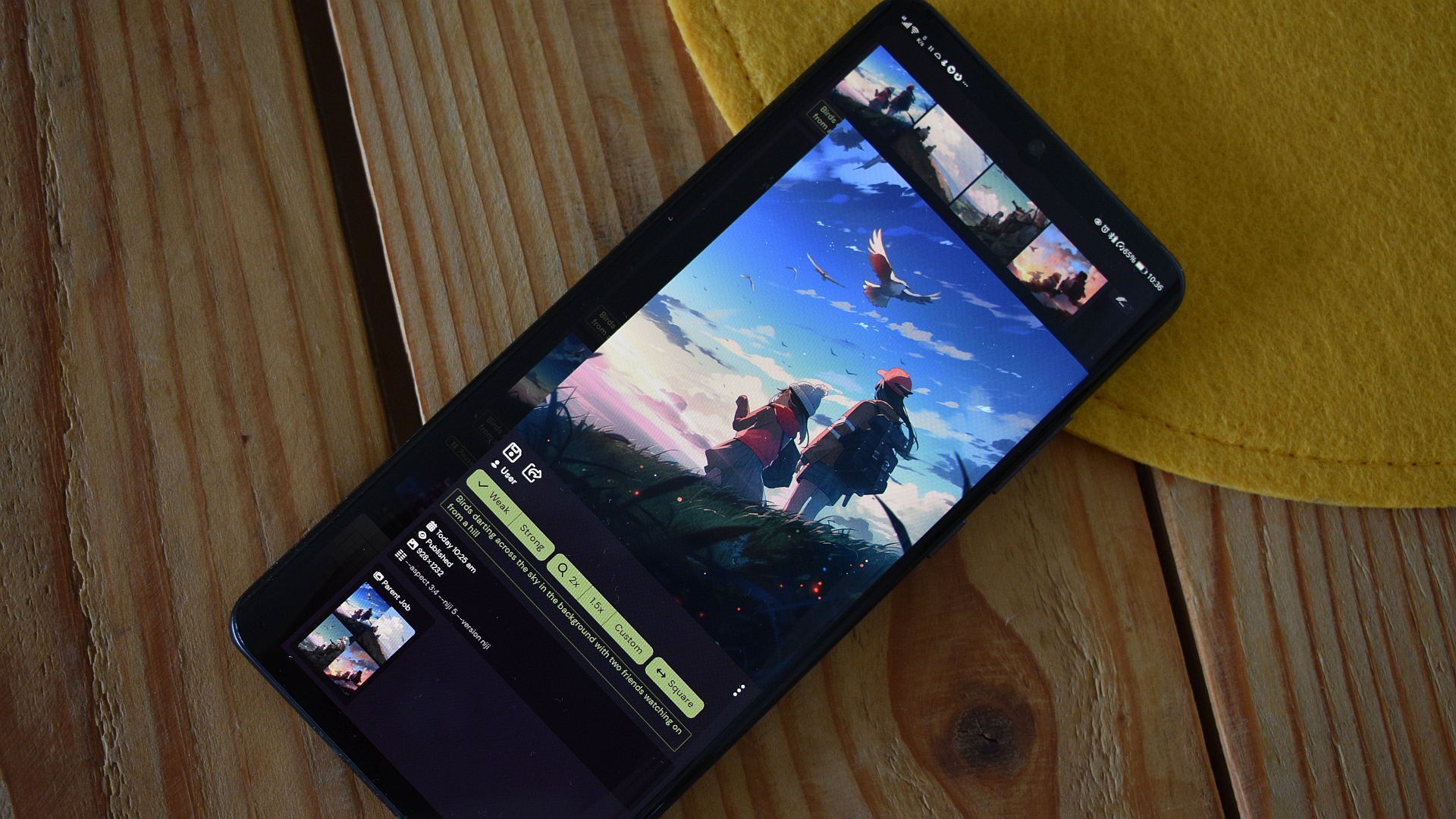
At a passing glance, Midjourney and Stable Diffusion may look like they offer the same feature set. However, both image generators have some unique strengths and weaknesses.
Take upscaling, for example. Increasing the resolution of a single image can take up a significant amount of GPU resources, and you pay for that through your limited monthly allowance. Stable Diffusion’s open nature means you can download several different upscaling models to experiment with and you won’t. And if your computer has enough video memory, you can also generate higher-resolution images than Midjourney’s defaults.
Here’s a short list of some other feature differences between Midjourney and Stable Diffusion:
- Inpainting and outpainting: With Stable Diffusion, you can use inpainting to tweak certain parts of an existing image. Likewise, outpainting lets you generate new art outside the boundaries of an existing image. Midjourney has added these editing features as well via the “Vary” and “Zoom Out” buttons. But if you want greater control, I’d encourage you to look towards Photoshop’s Generative Fill feature instead.
- Image prompts: You can upload an image (or two) as part of your prompt in Midjourney. The bot will combine the image with your text to generate an output that’s visually similar to the input.
- Custom art styles: Midjourney offers an anime-optimized model you can invoke with the
--nijiparameter. However, Stable Diffusion lets you download custom models trained to replicate a variety of art styles, from realistic to origami. - Censorship: While the official base Stable Diffusion models don’t allow you to generate explicit images, you can work around these limitations with custom models. This is not possible with Midjourney and you may even find your account banned if your prompts contain explicit or suggestive language.
Keep in mind that you’ll have to use Stable Diffusion on your own hardware to reap most of its benefits. Online tools don’t offer the same level of flexibility, which makes Midjourney just as capable as Stable Diffusion.
Midjourney vs Stable Diffusion: Pricing
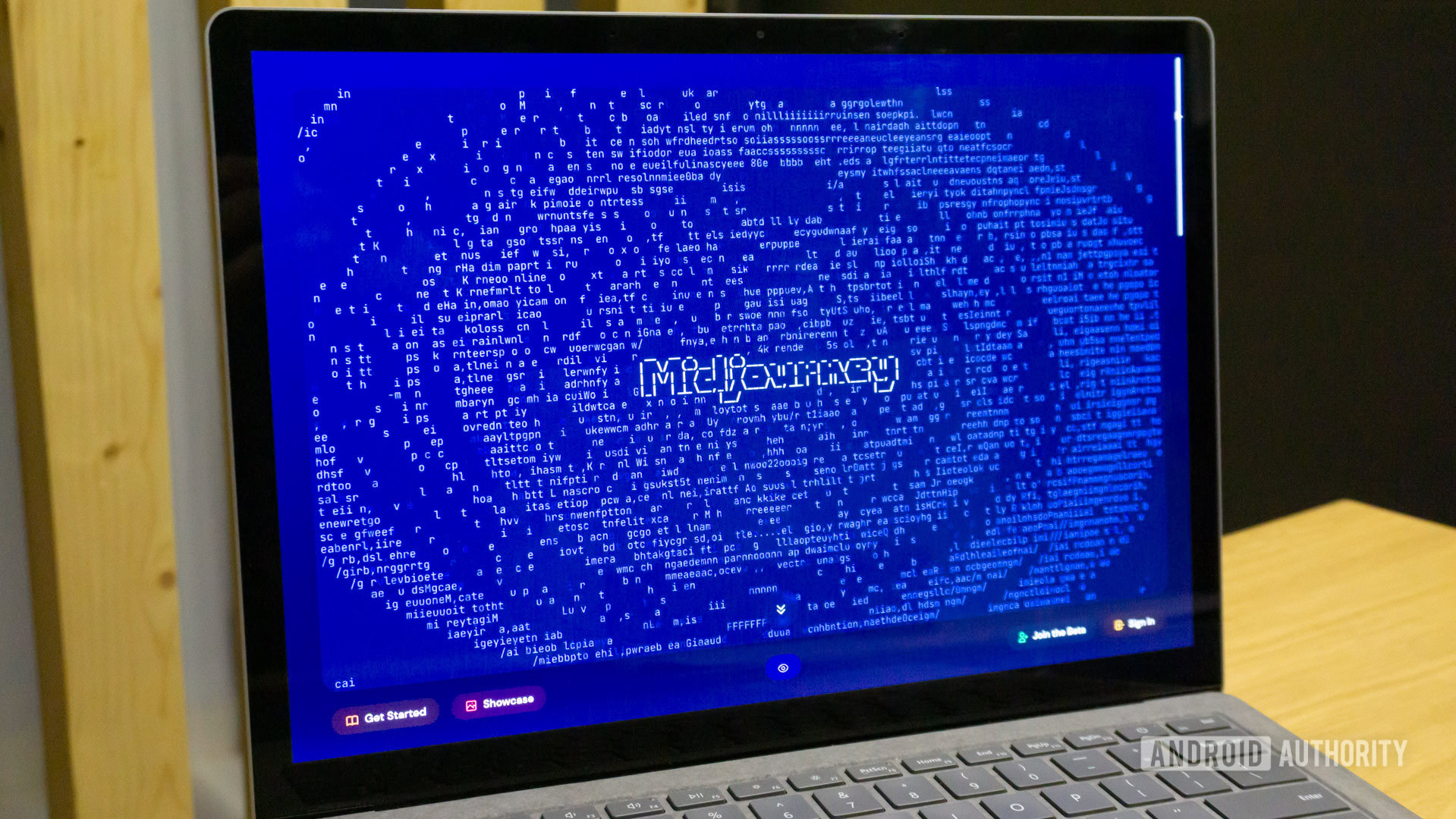
As a for-profit company, it’s not surprising that Midjourney imposes some limitations on how often you can use it. Even with a paid Midjourney subscription, you only get a limited amount of free image generation hours each month. The $30 and higher plans do offer unlimited hours of relaxed mode, but that means you’ll have to wait several minutes for each task. Moreover, there’s no free tier or trial whatsoever.
Stable Diffusion works in the exact opposite manner. Its source code is officially available to download, which means you can use it for free. However, you’ll need a beefy computer with a dedicated graphics card. Most models consume at least 4GB of VRAM, so a modern gaming PC fits the bill. But if you don’t already own one, that kind of hardware can easily cost you over a thousand dollars. Luckily, you can use Stable Diffusion online or even in a cloud-based virtual machine like Google Colab if you’re adventurous.
You can use Stable Diffusion for free, but it will take some effort.
It’s worth noting that the creators of Stable Diffusion also offer a web-based image generation app called DreamStudio. It’s easy to get started with, just like Midjourney, but it comes at a cost. Still, it’s quite a bit cheaper since $10 grants you 1,000 credits. You can also try it for free as all new accounts get 25 credits upon signup.
If you’re looking for a completely free and easy-to-use option, I’d recommend considering a third Midjourney alternative like Meta Imagine or Microsoft Designer (formerly Bing Image Creator). Bing uses OpenAI’s DALL-E 3 model which is completely unrelated to Stable Diffusion or Midjourney.
Midjourney vs Stable Diffusion: Which one to use?
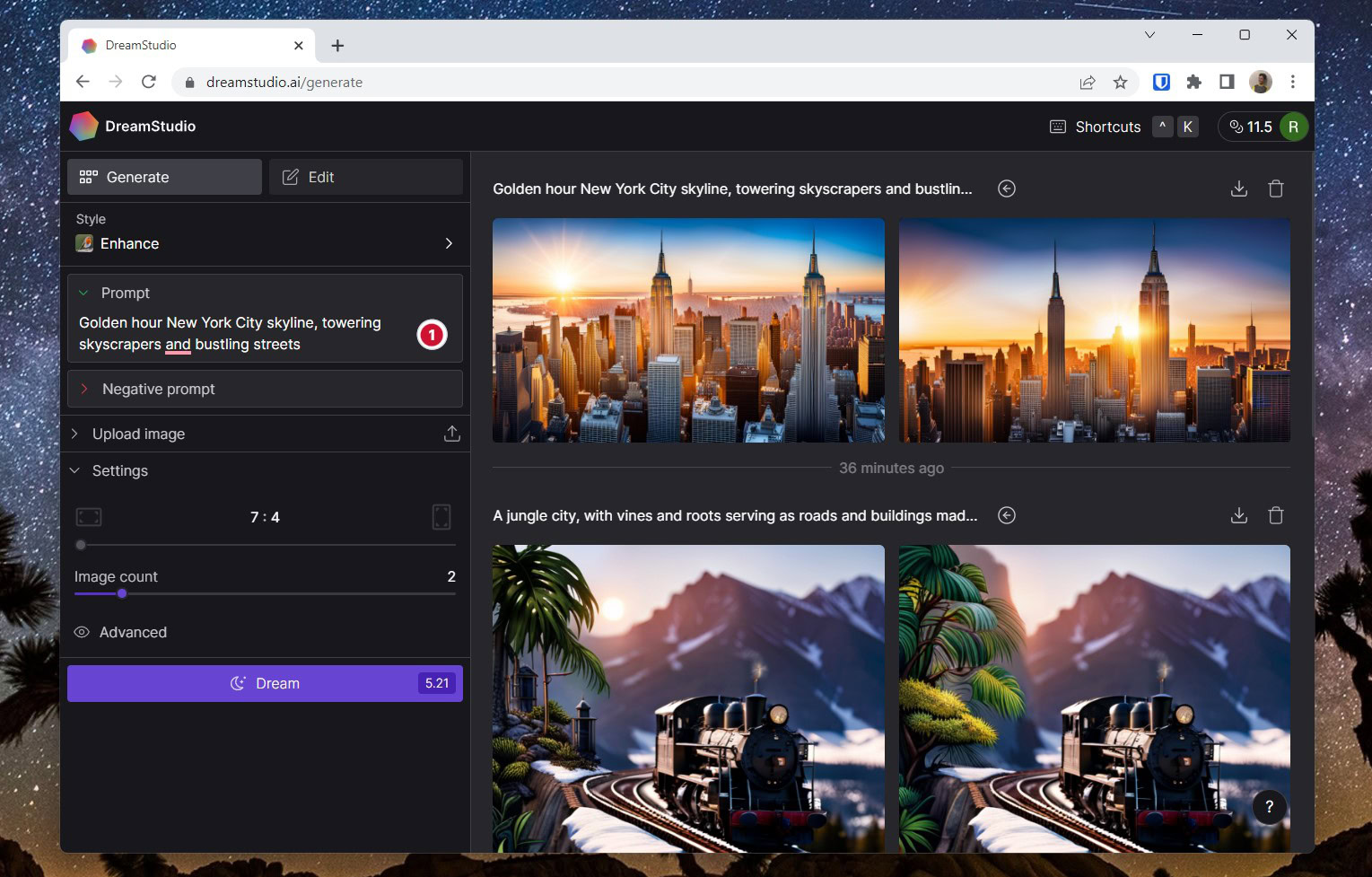
Let’s take a look at some real-world examples to see which AI image generator comes out ahead. For this comparison, I’ll use DreamStudio to generate images via Stable Diffusion as it’s just as easy to use as Midjourney. I could perhaps get better results with custom models, but that would take far more effort. So to keep things fair, let’s compare the one-click experience of using Midjourney and Stable Diffusion.
The first image was generated with a rather simplistic prompt: “Star Wars’ Darth Vader, but make it cyberpunk”. I think both image generators did quite well with the limited information provided, even if they took drastically different approaches.
The next prompt clearly showcases one of Midjourney’s greatest strengths: realism. If you’re looking to generate images that look like they’re grounded in reality, you’ll often get better results than most other AI image generators. While Stable Diffusion matches everything contained in the prompt, it doesn’t live up to the “photorealistic” bit.
For our final example, take a look at how the two image generators handle fantasy prompts. I entered a text prompt asking for a large white serpentine dragon perched atop a rock watching the horizon. Once again, it’s clear that Midjourney can generate more intricate detail. However, if you look closely at the bottom of the image, you’ll notice a series of garbled letters where Midjourney tried to replicate a watermark it learned from its training data.
It’s worth repeating that advanced users can extract far better images from Stable Diffusion than the examples showcased here. However, when comparing the two easiest-to-use options, I’ve found that Midjourney often delivers better results for the same input prompt. Which AI image generator do you prefer?
Which AI image generator do you prefer?
FAQs
Stable Diffusion has the potential to match Midjourney in many scenarios. However, you will need to perfect your prompts and experiment with different models to get the best results. Midjourney is much simpler to use from an average user’s perspective.
Midjourney, DALL-E, and Stable Diffusion are all competing AI image generators that have very little in common. They will all produce different results.
AI image generators like Midjourney have been trained on millions of images. However, there is no evidence suggesting they reproduce existing art or images.
